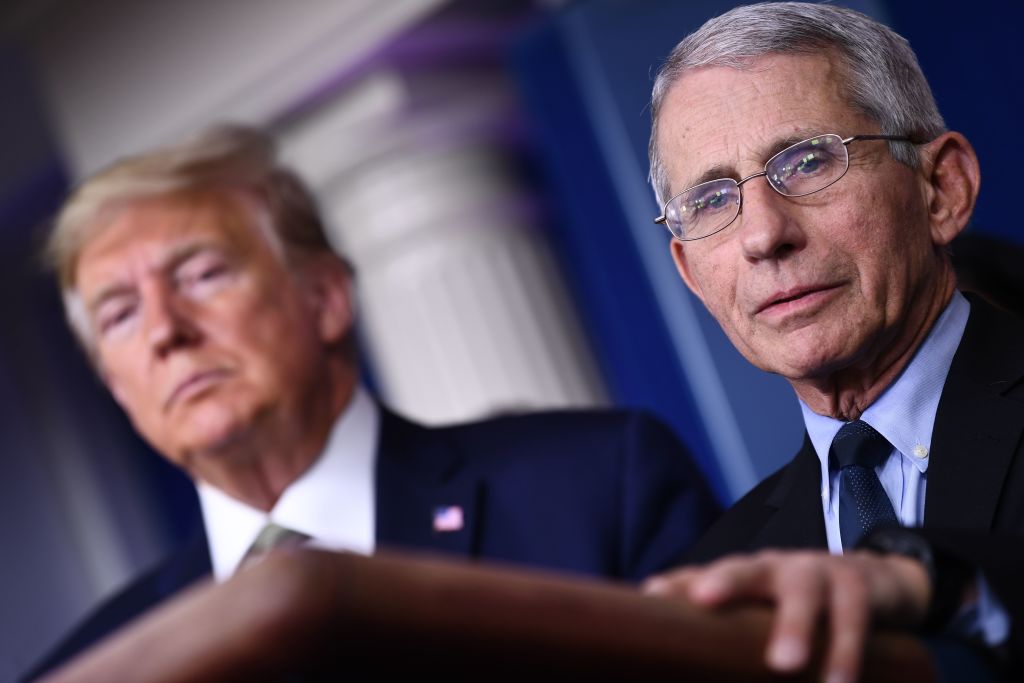Trump aides say he's starting to lose his patience with Dr. Anthony Fauci


A free daily email with the biggest news stories of the day – and the best features from TheWeek.com
You are now subscribed
Your newsletter sign-up was successful
President Trump and senior White House advisers are starting to lose patience with Dr. Anthony Fauci, the director of the National Institute of Allergy and Infectious Diseases, as he continues to publicly correct Trump when he makes false statements about the coronavirus, The New York Times reports.
Fauci has been a familiar face at coronavirus briefings. In recent days, Fauci and Trump have disagreed on how long it will take for a coronavirus vaccine to be ready for use and whether an anti-malaria drug could help certain coronavirus patients. Over the weekend, Fauci told Science magazine that even when they aren't on the same page, if it's a "substantive issue," Trump "does listen to what I say." He also admitted that when Trump says something that's not true, "I can't jump in front of the microphone and push him down. Okay, he said it. Let's try and get it corrected for the next time."
Multiple people close to Trump told the Times' Maggie Haberman that they consider such remarks as digs against Trump, and they don't know how Fauci has enough time to even sit down for an interview. Although he may be getting under Trump's skin, the president is aware that a vast majority of the public trusts Fauci, and the benefits of having him in his orbit outweigh the negatives, the Times reports.
The Week
Escape your echo chamber. Get the facts behind the news, plus analysis from multiple perspectives.

Sign up for The Week's Free Newsletters
From our morning news briefing to a weekly Good News Newsletter, get the best of The Week delivered directly to your inbox.
From our morning news briefing to a weekly Good News Newsletter, get the best of The Week delivered directly to your inbox.
Fauci was absent at Monday evening's coronavirus briefing, and when asked about his whereabouts, Trump responded, "He's a good man."
A free daily email with the biggest news stories of the day – and the best features from TheWeek.com
Catherine Garcia has worked as a senior writer at The Week since 2014. Her writing and reporting have appeared in Entertainment Weekly, The New York Times, Wirecutter, NBC News and "The Book of Jezebel," among others. She's a graduate of the University of Redlands and the Columbia University Graduate School of Journalism.
-
 ‘The forces he united still shape the Democratic Party’
‘The forces he united still shape the Democratic Party’Instant Opinion Opinion, comment and editorials of the day
-
 The year’s ‘it’ vegetable is a versatile, economical wonder
The year’s ‘it’ vegetable is a versatile, economical wonderthe week recommends How to think about thinking about cabbage
-
 Moltbook: The AI-only social network
Moltbook: The AI-only social networkFeature Bots interact on Moltbook like humans use Reddit
-
 Judge orders Washington slavery exhibit restored
Judge orders Washington slavery exhibit restoredSpeed Read The Trump administration took down displays about slavery at the President’s House Site in Philadelphia
-
 Kurt Olsen: Trump’s ‘Stop the Steal’ lawyer playing a major White House role
Kurt Olsen: Trump’s ‘Stop the Steal’ lawyer playing a major White House roleIn the Spotlight Olsen reportedly has access to significant U.S. intelligence
-
 Hyatt chair joins growing list of Epstein files losers
Hyatt chair joins growing list of Epstein files losersSpeed Read Thomas Pritzker stepped down as executive chair of the Hyatt Hotels Corporation over his ties with Jeffrey Epstein and Ghislaine Maxwell
-
 Judge blocks Hegseth from punishing Kelly over video
Judge blocks Hegseth from punishing Kelly over videoSpeed Read Defense Secretary Pete Hegseth pushed for the senator to be demoted over a video in which he reminds military officials they should refuse illegal orders
-
 Trump’s EPA kills legal basis for federal climate policy
Trump’s EPA kills legal basis for federal climate policySpeed Read The government’s authority to regulate several planet-warming pollutants has been repealed
-
 House votes to end Trump’s Canada tariffs
House votes to end Trump’s Canada tariffsSpeed Read Six Republicans joined with Democrats to repeal the president’s tariffs
-
 Bondi, Democrats clash over Epstein in hearing
Bondi, Democrats clash over Epstein in hearingSpeed Read Attorney General Pam Bondi ignored survivors of convicted sex offender Jeffrey Epstein and demanded that Democrats apologize to Trump
-
 El Paso airspace closure tied to FAA-Pentagon standoff
El Paso airspace closure tied to FAA-Pentagon standoffSpeed Read The closure in the Texas border city stemmed from disagreements between the Federal Aviation Administration and Pentagon officials over drone-related tests
